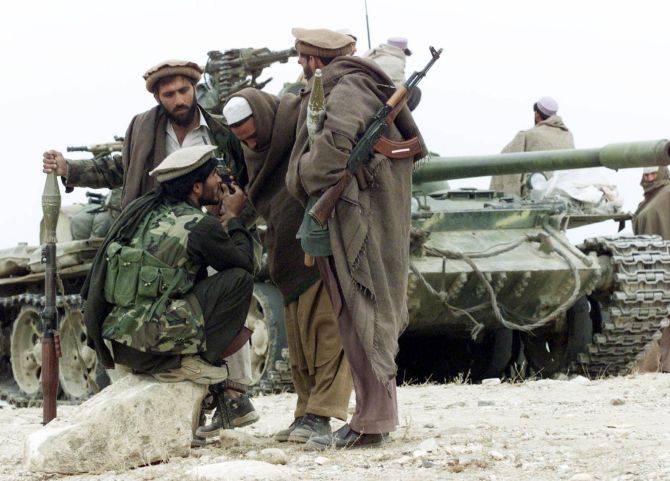The current Indo-Pak crisis over Kashmir is a godsend for the US. With tensions running high, Pakistan is in no position to militarily help the Taliban. Once this realisation dawns on the Taliban, they are likely to be more amenable to a compromise on American terms, says Colonel Anil Athale (retired).
There is a common (mis)perception that the tensions between India and Pakistan over Kashmir are NOT in the American interest as it will hinder Pakistan from ‘helping’ the US in Afghanistan.
This is peculiar myth propagated by Pakistan, and the reality is exactly opposite.
To understand the issue it is necessary to have a look at the recent past and also understand certain fundamental facts about Afghanistan.
Many analysts and commentators make the mistake of equating the situation prevailing in the 1990s with situation today. At that time Najibullah’s government was propped up by the erstwhile Soviet Union while the Taliban were supported by the US and Pakistan. The Soviets made Najibullah head of state in 1986 and withdrew their troops in 1989, leaving him in charge.
Najibullah surprised the world by defending Kabul from the Mujahideen/Taliban for another three years. He only fell when a major part of the Afghan forces under Rashid Dostum defected and the Pakistan army helped the Taliban with tanks and guns. Najibullah was weakened after 1991 when the Soviet Union itself dissolved and its military aid stopped.
Even with Pakistan’s wholehearted support, it was only in 1996 that Taliban could take over Kabul.
In 2019 the boot is on the other shoe! It is the Americans who now support the Afghan government and are determined to keep a small force in Afghanistan, possibly the air support element.
The situation in Afghanistan is more like the situation in Iraq where the American installed government continues to hold sway even after the withdrawal of the bulk of US forces.
Much is made of Pakistani ‘influence’ over the Taliban. This is based on two pillars, one is the sanctuary that Pakistan has provided to the Taliban and second is the military help it gives to the rebels. Thus Pakistan is more a part of the problem rather than a part of the solution.
The Americans are well aware of this. It would indeed be a surprise if the Americans have forgotten how in the recent past, while Pakistan professed to fight the Al Qaeda and claimed to be an ally of the US, it sheltered Osama bin Laden in Abbottabad cantonment for several years.
The truth is that without wholehearted Pakistani support, the Taliban will not be able to defeat the Afghan government forces.
The basic logic of guerrilla war is that they cannot take on regular armed forces in open warfare. The power of modern weapons is such that the guerrillas cannot match it. Examples of this are aplenty in modern history. In 1971 in the Bangladesh war, the Mukti Bahini played a major role, but it was the regular Indian armed forces that defeated the Pakistanis.
Even the 30-year-long Vietnam war ended only when regular North Vietnam army invaded the South. On January 15, 1973, after pressuring South Vietnam to accept the peace deal, Nixon announced the end of offensive operations against North Vietnam.
The situation worsened in December 1974, when US Congress passed the Foreign Assistance Act of 1974, cutting off all military aid. This act removed the threat of air strikes should North Vietnam break the terms of the accords.
Shortly after the act’s passage, North Vietnam began a limited offensive in Phuoc Long province to test Saigon’s resolve. The province fell quickly and Hanoi pressed on with the attack. Surprised by the ease of their advance, against largely incompetent ARVN forces, the North Vietnamese stormed through the south, finally capturing Saigon. South Vietnam surrendered on April 30, 1975, following the fall of its capital.
More recently, the LTTE was wiped out when it confronted the Sri Lankan armed forces in an open war.
All in all, the American game plan appears to be to try and ‘bribe’ the Pak army with aid to make it desist from helping the Taliban in Afghanistan. It appears that the Pakistani army is so fixated on the ‘strategic depth’ in Afghanistan that it is trying to play its usual double game.
But should that fail, as is likely, keeping Pakistan engaged with India will help the survival of the Afghan regime.
The current Indo-Pak crisis over Kashmir is thus a godsend for the US. With tensions running high with India over Kashmir, Pakistan is in no position to militarily help the Taliban. Once this realisation dawns on the Taliban, they are likely to be more amenable to a compromise on American terms.
In addition to military tensions with India, Pakistan also faces the threat of international boycott over terror financing. Its economy is in a shambles and is only surviving on IMF loans and Chinese aid.
The American president has shown that he is not shy of using all the arrows in his quiver to ensure orderly American withdrawal from Afghanistan as that will ensure a second term for him in the 2020 elections.
Tension over Kashmir makes Pakistan, and by extension the Taliban, more malleable to a compromise in Afghanistan.
Thus, the apparent American support to the Indian position on Kashmir at the closed-door meeting of the UN Security Council on August 17 makes sense.
This goes against the conventional logic of talking heads on TV channels, but one must remember, in international affairs the ‘real’ as opposed to open strategy is very different.
The US will make appropriate noises about peace between India and Pakistan but will be secretly happy that Islamabad will be forced to fight on two fronts.
Source: Read Full Article


